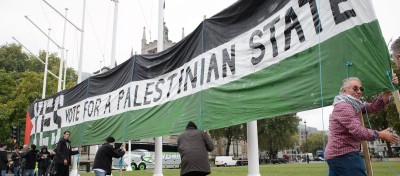When Will Israel Realize Palestinians Shall Never Give Up?

Every month, it seems, a new book on Palestine comes across my desk for review. I think: “Oh, this reminds me of one I saw last year,” or “She likely adopts the same theme as in her last novel.” Perusing a few pages of this volume, seeing that the stories herein are not really new, I nevertheless declare: “They will never give up”.
I mean by this, the infinite ways that Palestinians– mother, child, shopkeeper, student, prisoner, poet, exile or resident, teacher or politician, from peasants to scions of established Jerusalem or Jaffa families—devise to narrate their heavily traveled route from the bucolic olive groves and stone houses of the Jordan Valley, across the biblical lands, through wars, to prisoner cells, tattered refugee shelters and uneasy exile.
When I say ‘they never give up’ I am of course aware that countless have quit. Many perished in their struggle for statehood by one means or another; others have been co-opted into a bourgeois lifestyle and successfully (sic) assimilated, or otherwise lured away. Perhaps for every one still identifying with the struggle, ten times that number has burned out or lost hope. Not to mention countless (millions) of fellow Arabs who championed the cause with their scholarship and poems, offering Palestinians sanctuary, financial aid, diplomacy, and armed action as well.
Still we have at least four generations of Palestinians dispersed throughout the world–from Australia and South Africa to inside Israel, to the Caribbean Islands, Brazil and our New York neighborhoods– who persist. Many feel compelled to know and value their story, then to make others hear them and be moved. It’s not just the injustices and indignities endured, but the treasures as well: stories embedded inside found family portraits, in diplomas won, in property deeds folded away, in emblems embroidered into gowns, and in songs.
Just last month, my colleague Francisco Casanova (Chahin/el-Mufdi) originally of Beit Jala near Bethlehem, now settled in New York via Dominican Republic, circulated a newly unearthed photo of his great-grandparents Yadallah and Ackle Mufdi (~1920), located by his cousin in a magazine in Dominican Republic where Francisco’s family settled in the late 1800s.
This is one example of tens of thousands of narratives that infuse the enduring campaign. Traces make threads and threads are woven into something decipherable emerging into an instrument for action. Defying the Zionist agenda to erase Palestine, more stories emerge, year after year– from those married to non-Palestinians, even children of families who seemed to have forgotten the homeland. Memoirs pour forth from those with the most tenuous ties to the land as well as from those newly dispersed. This “persistence of memory” is discussed in poet Ibtisam Barakat’s latest essay.
What provokes my observation ‘they never give up’ is not just today’s hunger strike by Palestinian prisoners, not those past daring flotillas to Gaza, not inspiring graffiti on the apartheid wall or words by hip-hop artist Shadia Mansour. It’s the tireless reinvention of the quintessential story.
On my desk is the newly released Young Palestinians Speak: Living Under Occupation, yet another collection of testimonials and historical sketches. Designed for young readers, it offers maps, notes, interviews and photos assembled by two British writers.
Some may conclude it’s a worn and futile theme. Indeed, the book offers nothing new to those familiar with Palestinian history. But we always find people to whom the story is unknown. The books roll out, even when few Palestinian histories will reach American schoolrooms. A portrayal of military occupation in another part of the world may be welcomed by librarians. But given Israel’s vigilance of its international image, this book, if selected for an American school library or listed as a school resource for world history, may find itself banned.
From the testimonies of the children interviewed and comments by school staff quoted in Young Palestinians Speak, the injustices are evident. Like another collection for young readers, Gaza Writes Back, some writers, editors and publishers remain compelled to remind us of the story of Palestine. Sameeha Elwan, one of 23 contributors to the Gaza book writes how each tale,
“whether it stems from genuine experience, the representation of experiences of others, or those enshrined in Palestinians by virtue of being Palestinian … are worth remembering and telling. Memory is itself the only thing that is left of (our) comprehension of home and identity.”
Featured image: credits to the owner

